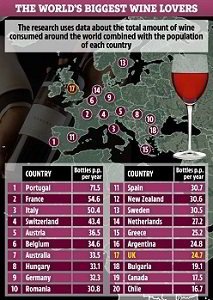
Views: 63
– Could wine be a preventative against flu viruses ?
Minapim by Hernan Valenzuela: In relation to the emergence of Corona virus – COVID-19, the Spanish Federation of Oenology has received numerous requests from members and other professional categories on various issues, including wine contamination, container contamination, limitation of the effects of wine on the action of the virus.
In this regard, with due caution, due to the fact that it is a new virus, FEAE, after a debate with important representatives of the medical community and other international associations of winemakers, points out the following:
- The survival of the virus in wine seems impossible because the concomitant combination of the presence of alcohol, a hypotonic environment, and the presence of polyphenols, prevents the life and multiplication of the virus itself.
- Contamination by packaging appears to be very remote, if not statistically non-existent, also in view of the short life of the virus and the absence of a positive “biological” living host.
- The moderate consumption of wine, linked to responsible consumption, can contribute to better hygiene of the oral cavity and the pharynx, the latter area where viruses nest during infections.

Santiago Jordi Martín
The statement of the President of the Spanish Enology Federation and Vice President of the International Winemakers Union, Santiago Jordi Martín; would be in line with a study, from the Washington School of Medicine in St. Louis, published in the prestigious journal Science.
Microbes that live in the gut don’t just digest food. They also have far-reaching effects on the immune system. The new study shows that a specific gut microbe can prevent serious flu infections, likely by breaking down natural compounds, called flavonoids, that are commonly found in foods like black tea, red wine, and blueberries.
The research, conducted by scientists at the University of Washington School of Medicine in St. Louis, also indicates that this strategy is effective in preventing serious damage caused by influenza when the interaction occurs prior to infection with the influenza virus. . This work could also help explain the wide variation in human responses to influenza infection.

“For years, flavonoids are believed to have protective properties that help regulate the immune system to fight infection,” said first author Ashley L. Steed, MD, PhD, a pediatric instructor treating patients in intensive care at Children’s Hospital. St Louis. “Flavonoids are common in our diets, so an important implication of our study is that flavonoids may work with gut microbes to protect us from the flu and other viral infections.
The flavonoids in wine may stop the flu from spreading and limit its symptoms. As long as it is a responsible and moderate consumption in healthy people, without previous pathologies.
World Consumption

In 2019, Portugal won first place, consuming 550 million liters of alcoholic beverages per year, or around 71.5 bottles of ordinary wine per person annually, according to Accor Hotels.
Despite being responsible for 29.5% of world wine exports, France was only in second place.
The survey found that each person consumes 54.6 bottles of wine per year, or 2,680 million liters in total.
The UK reached 17th place on the list, each with just 24.7 bottles per year, equivalent to 1.24 billion liters per nation.
Chile drinks the least amount of wine, ranking last, despite being voted the sixth best wine producer in the world.
The Italians came in third on the list, with each person consuming 50.4 bottles of drink per year, with Switzerland ranking fourth with 43.4 bottles each year.
Austria, Belgium, Australia and Hungary have also joined the 20 most wine-loving nations.
Sources: FEAE Accor hotels The Sun Washington University School of Medicine
Related article: Reducing the risk of virus infection including COVID
